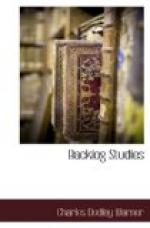The first fire that is lighted on the hearth in the autumn seems to bring out the cold weather. Deceived by the placid appearance of the dying year, the softness of the sky, and the warm color of the foliage, we have been shivering about for days without exactly comprehending what was the matter. The open fire at once sets up a standard of comparison. We find that the advance guards of winter are besieging the house. The cold rushes in at every crack of door and window, apparently signaled by the flame to invade the house and fill it with chilly drafts and sarcasms on what we call the temperate zone. It needs a roaring fire to beat back the enemy; a feeble one is only an invitation to the most insulting demonstrations. Our pious New England ancestors were philosophers in their way. It was not simply owing to grace that they sat for hours in their barnlike meeting-houses during the winter Sundays, the thermometer many degrees below freezing, with no fire, except the zeal in their own hearts,—a congregation of red noses and bright eyes. It was no wonder that the minister in the pulpit warmed up to his subject, cried aloud, used hot words, spoke a good deal of the hot place and the Person whose presence was a burning shame, hammered the desk as if he expected to drive his text through a two-inch plank, and heated himself by all allowable ecclesiastical gymnastics. A few of their followers in our day seem to forget that our modern churches are heated by furnaces and supplied with gas. In the old days it would have been thought unphilosophic as well as effeminate to warm the meeting-houses artificially. In one house I knew, at least, when it was proposed to introduce a stove to take a little of the chill from the Sunday services, the deacons protested against the innovation. They said that the stove might benefit those who sat close to it, but it would drive all the cold air to the other parts of the church, and freeze the people to death; it was cold enough now around the edges. Blessed days of ignorance and upright living! Sturdy men who served God by resolutely sitting out the icy hours of service, amid the rattling of windows and the carousal of winter in the high, windswept galleries! Patient women, waiting in the chilly house for consumption to pick out his victims, and replace the color of youth and the flush of devotion with the hectic of disease! At least, you did not doze and droop in our over-heated edifices, and die of vitiated air and disregard of the simplest conditions of organized life. It is fortunate that each generation does not comprehend its own ignorance. We are thus enabled to call our ancestors barbarous. It is something also that each age has its choice of the death it will die. Our generation is most ingenious. From our public assembly-rooms and houses we have almost succeeded in excluding pure air. It took the race ages to build dwellings that would keep out rain; it has taken longer to build houses air-tight, but we are on the eve of success. We are only foiled by the ill-fitting, insincere work of the builders, who build for a day, and charge for all time.




